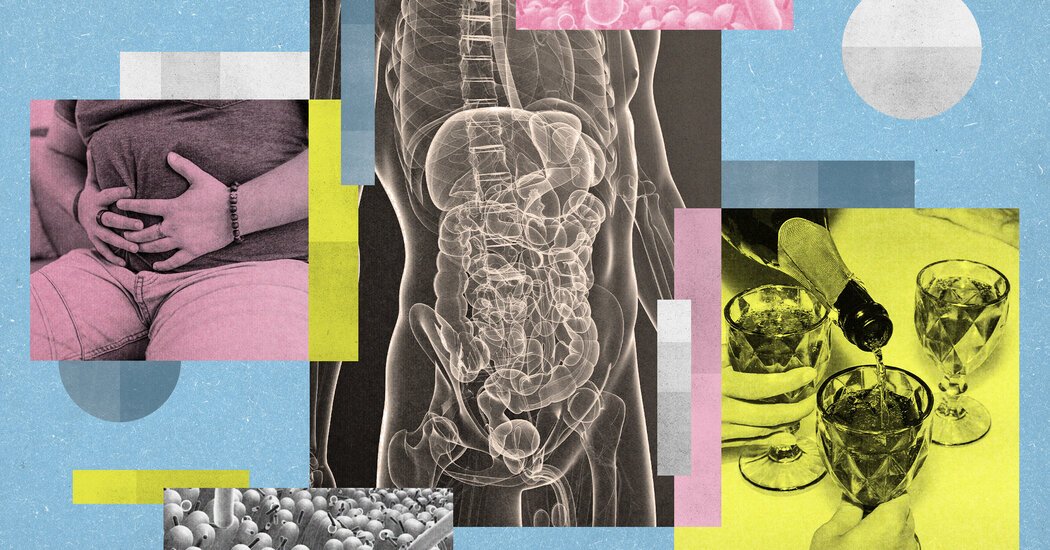6 Ways Alcohol Can Affect Your Gut
When we published an article last year about the various ways alcohol might change your gut microbiome, the reader response was overwhelming.
One person said that after quitting alcohol, digestive issues practically vanished. Others said that curtailing their drinking helped with bloating, acid reflux, irritable bowel syndrome and more.
That’s not surprising, said Dr. Morgan Sendzischew Shane, a gastroenterologist at the University of Miami Health System. Some people may notice gut discomfort after a single drink, she said, while others may not be aware of a connection at all. But alcohol can have many negative consequences for the digestive system — from short-term symptoms to longer-term health risks.
Here are six effects alcohol can have on your gut.
1. Acid Reflux
Drinking alcohol causes the muscles in your body to relax, including the muscular valve that seals off your stomach from your esophagus. That can make the valve open more than it should, Dr. Shane said, allowing stomach acid to escape into your esophagus. This can cause heartburn, pain and other symptoms of reflux.
Acidic alcoholic beverages (like wine and cider) and carbonated ones (like beer and some cocktails) can worsen reflux symptoms, said Dr. Cynthia Hsu, a gastroenterologist and an assistant professor of medicine at the University of California, San Diego.
2. Inflammation and Bleeding
Even one night of heavy drinking may cause your stomach lining to become inflamed, leading to symptoms like nausea, stomach pain or discomfort for a day or two, Dr. Shane said. That inflammation is temporary and can heal quickly — kind of like when a burn on the roof of your mouth from eating hot food heals within a few days, Dr. Shane said.
Alcohol can also increase your risk of bleeding in the digestive tract. In a 2016 study of nearly 50,000 men in the United States who were followed for 26 years, those who consumed one to two drinks per day were 67 percent more likely than men who didn’t drink at all to develop serious gastrointestinal bleeding, mainly from ulcers in the stomach and the first part of the small intestine. The risk was greatest for men who regularly consumed alcohol, especially liquor, outside of mealtimes.
3. Gas and Bloating
When you consume alcohol, the stomach absorbs a small amount of it, with your intestines absorbing or breaking down the rest. But drink too much at once — faster than your body can absorb the alcohol — and you’ll end up with more alcohol than usual mixing with the microbes in your intestines, Dr. Hsu said.
Those microbes can break down alcohol — a process that can produce gas and can lead to bloating, pain and pressure in some people, Dr. Shane said.
Regular or heavy alcohol use may also create an imbalance in the types and amounts of microbes living in your gut, potentially contributing to chronic bloating and discomfort, Dr. Hsu said.
4. Abnormal Bowel Habits
Alcohol pulls water into your intestine, which can cause loose stools, Dr. Shane said.
It may also affect the nerves in the intestinal wall that control movements through your gut, usually speeding them up and contributing to diarrhea, said Dr. Gyongyi Szabo, a professor of medicine at Harvard Medical School. For poorly understood reasons, she said, alcohol can have the opposite effect in some people; it may slow down gut movements and worsen constipation.
Heavy drinking can also cause or exacerbate lactose intolerance, because alcohol can damage the cells that make the enzyme that breaks down the natural sugars in milk, said Dr. Ali Keshavarzian, a gastroenterologist and professor of internal medicine at Rush University in Chicago. That can leave you more likely to have diarrhea or other digestive discomforts after consuming dairy products, he said.
5. Gut “Leakiness”
Research suggests that even a single episode of binge drinking — typically defined as four or more drinks within about two hours for women, or five or more drinks within that time frame for men — can make your intestinal lining more permeable, or “leaky,” Dr. Szabo said. That can allow toxins from the gut to leak into the bloodstream, causing inflammation around the body, she said.
In a study from Dr. Szabo’s lab, 25 adults drank enough vodka (mixed with an orange-strawberry juice) to bring their blood alcohol concentrations to about 0.08, the drunk-driving limit in the United States. Thirty minutes after consuming the alcohol, the researchers found, the participants had increased levels of toxins from the gut and of inflammatory markers in their blood, whereas the control subjects who drank orange juice did not.
Gut inflammation and leakiness do not cause immediate symptoms, Dr. Keshavarzian said. But having a more permeable intestine lining can increase a person’s risk of developing liver disease, because it allows toxins from the gut to travel to the liver and cause inflammation there.
6. Cancer Risk
In January, Dr. Vivek Murthy, the former surgeon general of the United States, warned that drinking alcohol could increase the risk of at least seven types of cancer, including those of the mouth, throat, esophagus, liver, colon and rectum.
Even low levels of alcohol consumption, such as one drink per day, can contribute to cancer risk in various ways, Dr. Keshavarzian said. It can promote harmful processes in the body that lead to inflammation, he said, and can damage to your DNA, cells and proteins.



Post Comment